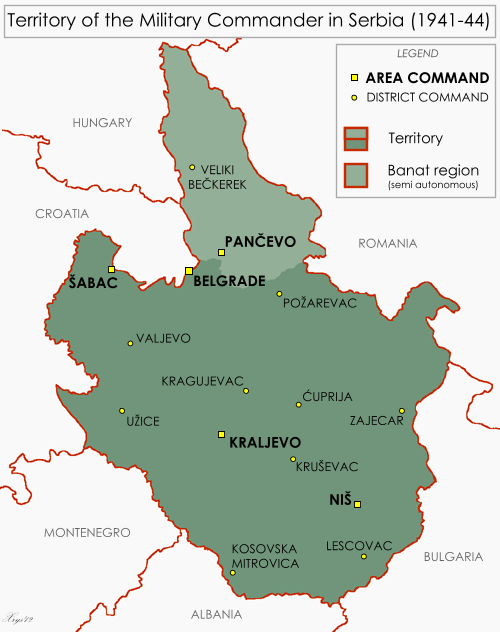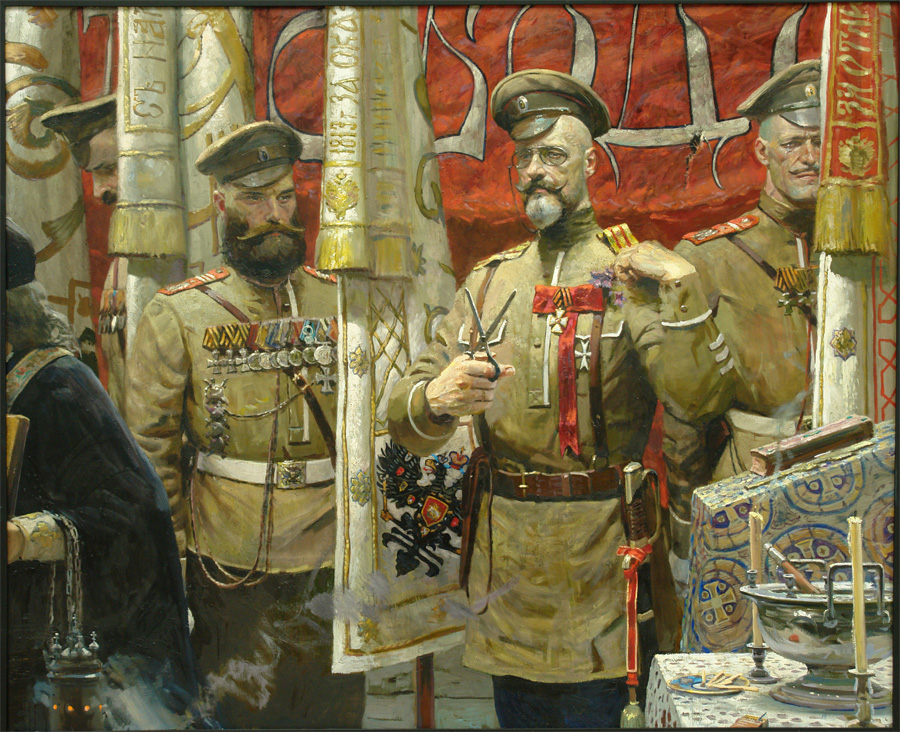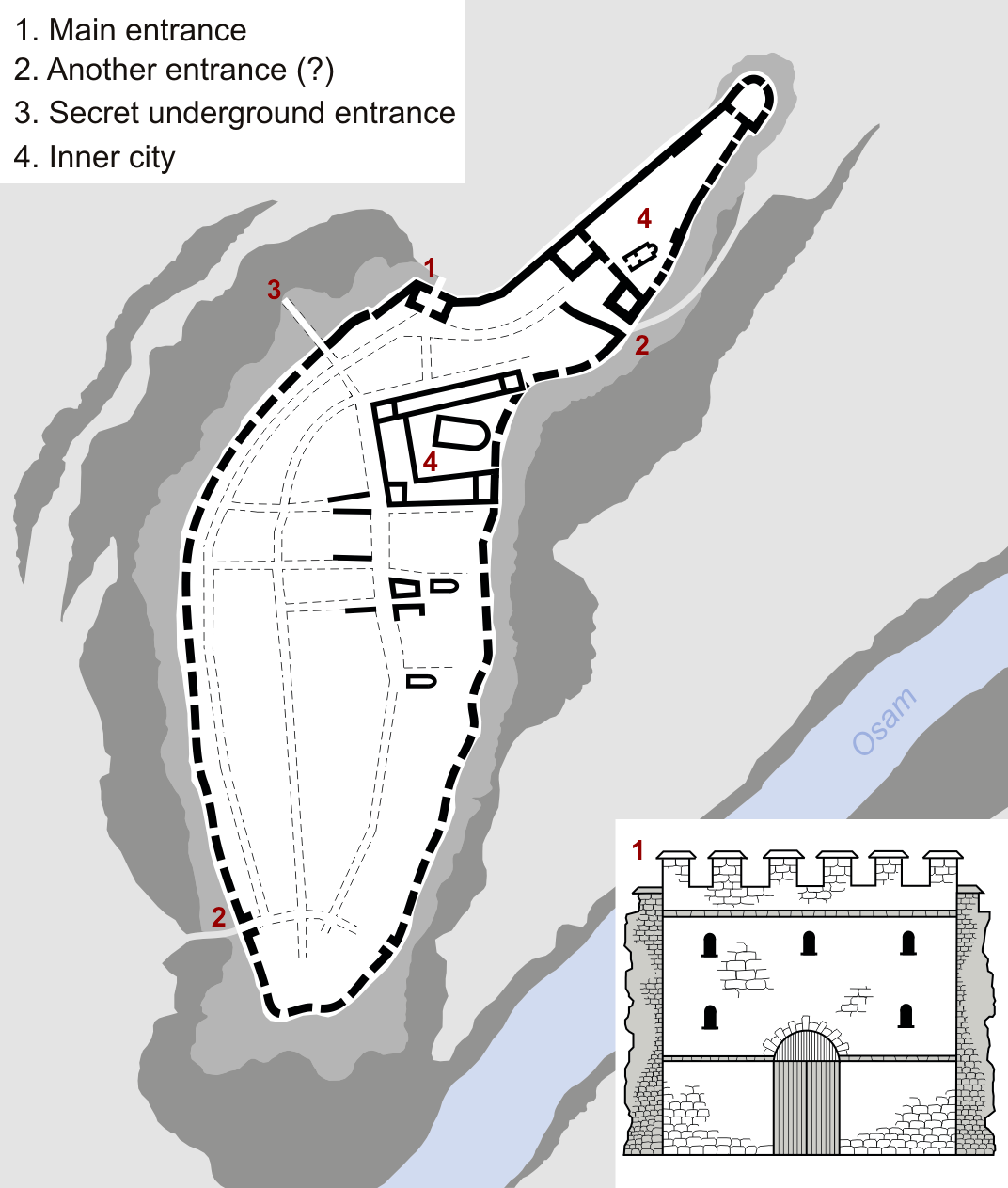|
Mikhail Skorodumov
Mikhail Fedorovich Skorodumov () was a Russian general who participated in World War I, the White movement, and founded the Nazi-allied Russian Corps in Serbia during World War II. Skorodumov was born in 1892. He graduated the 1st Cadet Corps and the Pavlovsk Military Academy in 1912, as a sub-lieutenant of the Pavlovsk detachment. In 1914 with his detachment he was sent to the front. He was awarded the St. Vladimir order for bravery in battle, during which he was heavily wounded and consequently placed off duty. Skorodumov lobbied strongly to return to the front, and in 1915 was taken prisoner by the Germans. He unsuccessfully tried to escape three times, and after seven months of imprisonment returned to St. Petersburg in a prisoner exchange agreement (thanks partly to the lobbying of Grand Duchess Maria Pavlovna). He was awarded the Cross of St. George for bravery. In the wake of the October Revolution Skorodumov joined an underground anti-Bolshevik officer's organization. ... [...More Info...] [...Related Items...] OR: [Wikipedia] [Google] [Baidu] |
Skorodumov
Skorodumov (), feminine: Skorodumova is a Russian surname. Boris Unbegaun writes that it originates in the tradition of the surnames of Russian Orthodox clergy. This one was given to smart students of theological schools, literally meaning "quick-witted": "skoro-" ('quick') + "-dum-" ('think')+ "-ov" (typical surname suffix).Boris Unbegaun, ''Русские фамилии'', pp169–180/ref> Notable people with the surname include: *Gavriil Skorodumov (1754–1792), Russian engraver, draftsman, and painter *Mikhail Skorodumov, (1892–1963), Russian general * (1888–1955), bishop of the Russian Orthodox Church Outside of Russia The Russian Orthodox Church Outside of Russia (), also called Russian Orthodox Church Outside Russia or ROCOR, or Russian Orthodox Church Abroad (ROCA), is a semi-autonomous part of the Russian Orthodox Church (Moscow Patriarchate). Currently, t ... * Valeri Skorodumov See also * * References {{surname Russian-language surnames ... [...More Info...] [...Related Items...] OR: [Wikipedia] [Google] [Baidu] |
Pyotr Nikolayevich Wrangel
Baron Pyotr Nikolayevich Wrangel (, ; ; 25 April 1928), also known by his nickname the Black Baron, was a Russian military officer of Baltic German origin in the Imperial Russian Army. During the final phase of the Russian Civil War, he was commanding general of the anti-Bolshevik White Army in Southern Russia. A member of the prominent Wrangel noble family, Pyotr Wrangel was educated as a mining engineer and volunteered in the Russian Imperial Guard. He served with distinction during World War I as a cavalry commander, reaching the rank of major general. After the February Revolution and Russia's exit from the war, Wrangel retired to Crimea. He was arrested by the Bolsheviks following the October Revolution, but was soon released and later escaped and joined the anti-Bolshevik Volunteer Army of the White movement. In 1918, he became Anton Denikin's chief of staff in the Armed Forces of South Russia. Wrangel succeeded Denikin as commander-in-chief of the White forces in C ... [...More Info...] [...Related Items...] OR: [Wikipedia] [Google] [Baidu] |
Shoemaking
Shoemaking is the process of making footwear. Originally, shoes were made one at a time by hand, often by groups of shoemakers, or '' cordwainers'' (sometimes misidentified as cobblers, who repair shoes rather than make them). In the 18th century, dozens or even hundreds of masters, journeymen, and apprentices (both men and women) would work together in a shop, dividing the work into individual tasks. A customer could come into a shop, be individually measured, and return to pick up their new shoes in as little as a day. Everyone needed shoes, and the median price for a pair was about one day’s wages for an average journeyman. The shoemaking trade flourished in the eighteenth and early nineteenth centuries but began to be affected by industrialization in the later nineteenth century. Traditional handicraft shoemaking has now been largely superseded in volume of shoes produced by industrial mass production of footwear, but not necessarily in quality, attention to detail, or ... [...More Info...] [...Related Items...] OR: [Wikipedia] [Google] [Baidu] |
Boris Shteifon
Boris Aleksandrovich Shteifon (; 6 December 1881 – 30 April 1945) was a Russian lieutenant general Lieutenant general (Lt Gen, LTG and similar) is a military rank used in many countries. The rank traces its origins to the Middle Ages, where the title of lieutenant general was held by the second-in-command on the battlefield, who was norma ... in the Imperial Russian Army, who subsequently served as a general in the White movement, anti-communist White Army, and as the leader of the Collaboration with Nazi Germany and Fascist Italy, Nazi-allied Russian Corps in the Territory of the Military Commander in Serbia, German occupied territory of Serbia during World War II in World War II in Yugoslavia, Yugoslavia. Biography Boris Shteifon was born in 1881 in Kharkiv, Kharkov (now in Ukraine). His father was a Jewish merchant converted to Eastern Orthodox Church, Orthodox Christianity, his mother was the daughter of a Russian Orthodox deacon. He graduated from the Chuguyivske J ... [...More Info...] [...Related Items...] OR: [Wikipedia] [Google] [Baidu] |
Gestapo
The (, ), Syllabic abbreviation, abbreviated Gestapo (), was the official secret police of Nazi Germany and in German-occupied Europe. The force was created by Hermann Göring in 1933 by combining the various political police agencies of Free State of Prussia, Prussia into one organisation. On 20 April 1934, oversight of the Gestapo passed to the head of the ''Schutzstaffel'' (SS), Heinrich Himmler, who was also appointed Chief of German Police by Hitler in 1936. Instead of being exclusively a Prussian state agency, the Gestapo became a national one as a sub-office of the (SiPo; Security Police). From 27 September 1939, it was administered by the Reich Security Main Office (RSHA). It became known as (Dept) 4 of the RSHA and was considered a sister organisation to the (SD; Security Service). The Gestapo committed widespread atrocities during its existence. The power of the Gestapo was used to focus upon political opponents, ideological dissenters (clergy and religious org ... [...More Info...] [...Related Items...] OR: [Wikipedia] [Google] [Baidu] |
Russian Liberation Movement
Andrey Andreyevich Vlasov (, – August 1, 1946) was a Soviet Russian Red Army general. During the Axis-Soviet campaigns of World War II, he fought (1941–1942) against the ''Wehrmacht'' in the Battle of Moscow and later was captured attempting to lift the siege of Leningrad. After his capture, he defected to the Third Reich and nominally headed the collaborationist Russian Liberation Army (''Russkaya osvoboditel'naya armiya'', ROA), also becoming the political leader of the Russian collaborationist anti-Soviet movement. Initially, this army existed only on paper and was used by Germans to goad Red Army troops to surrender, while any political and military activities were officially forbidden to him by the Nazis after his visits to the occupied territory; only in November 1944 did Heinrich Himmler, aware of Germany's shortage of manpower, arrange for Vlasov formations composed of Soviet prisoners of war as armed forces of Committee for the Liberation of the Peoples of Rus ... [...More Info...] [...Related Items...] OR: [Wikipedia] [Google] [Baidu] |
Eastern Front (World War II)
The Eastern Front, also known as the Great Patriotic War (term), Great Patriotic War in the Soviet Union and its successor states, and the German–Soviet War in modern Germany and Ukraine, was a Theater (warfare), theatre of World War II fought between the European Axis powers and Allies of World War II, Allies, including the Soviet Union (USSR) and Polish Armed Forces in the East, Poland. It encompassed Central Europe, Eastern Europe, Northern Europe, Northeast Europe (Baltic states, Baltics), and Southeast Europe (Balkans), and lasted from 22 June 1941 to 9 May 1945. Of the estimated World War II casualties, 70–85 million deaths attributed to World War II, around 30 million occurred on the Eastern Front, including 9 million children. The Eastern Front was decisive in determining the outcome in the European theatre of World War II, European theatre of operations in World War II, eventually serving as the main reason for the defeat of Nazi Germany and the Axis ... [...More Info...] [...Related Items...] OR: [Wikipedia] [Google] [Baidu] |
White Emigre
White is the lightest color and is achromatic (having no chroma). It is the color of objects such as snow, chalk, and milk, and is the opposite of black. White objects fully (or almost fully) reflect and scatter all the visible wavelengths of light. White on television and computer screens is created by a mixture of red, blue, and green light. The color white can be given with white pigments, especially titanium dioxide. In ancient Egypt and ancient Rome, priestesses wore white as a symbol of purity, and Romans wore white togas as symbols of citizenship. In the Middle Ages and Renaissance a white unicorn symbolized chastity, and a white lamb sacrifice and purity. It was the royal color of the kings of France as well as the flag of monarchist France from 1815 to 1830, and of the monarchist movement that opposed the Bolsheviks during the Russian Civil War (1917–1922). Greek temples and Roman temples were faced with white marble, and beginning in the 18th century, ... [...More Info...] [...Related Items...] OR: [Wikipedia] [Google] [Baidu] |
Russian Protective Corps
The Russian Protective Corps (, / ''Russkiy okhrannyy korpus'', / ''Ruski zaštitni korpus'') was an armed force composed of anti-communist White Russian émigrés that was raised in the German occupied territory of Serbia during World War II. Commanded for almost its whole existence by Lieutenant General Boris Shteifon, it served primarily as a guard force for factories and mines between late 1941 and early 1944, initially as the "Separate Russian Corps" then Russian Factory Protective Group. It was incorporated into the Wehrmacht on 1 December 1942 and later clashed with the communist-led Yugoslav Partisans and briefly with the Chetniks. In late 1944, it fought against the Red Army during the Belgrade Offensive, later withdrawing to Bosnia and Slovenia as the German forces retreated from Yugoslavia and Greece. After Shteifon′s death in Zagreb, the Independent State of Croatia, on 30 April 1945, Russian Colonel Anatoly Rogozhin took over and led his troops farther north to ... [...More Info...] [...Related Items...] OR: [Wikipedia] [Google] [Baidu] |
Kingdom Of Yugoslavia
The Kingdom of Yugoslavia was a country in Southeast Europe, Southeast and Central Europe that existed from 1918 until 1941. From 1918 to 1929, it was officially called the Kingdom of Serbs, Croats, and Slovenes, but the term "Yugoslavia" () has been its colloquial name as early as 1922 due to its origins. "Kraljevina Jugoslavija! Novi naziv naše države. No, mi smo itak med seboj vedno dejali Jugoslavija, četudi je bilo na vseh uradnih listih Kraljevina Srbov, Hrvatov in Slovencev. In tudi drugi narodi, kakor Nemci in Francozi, so pisali že prej v svojih listih mnogo o Jugoslaviji. 3. oktobra, ko je kralj Aleksander podpisal "Zakon o nazivu in razdelitvi kraljevine na upravna območja", pa je bil naslov kraljevine Srbov, Hrvatov in Slovencev za vedno izbrisan." (Naš rod ("Our Generation", a monthly Slovene language periodical), Ljubljana 1929/30, št. 1, str. 22, letnik I.) The official name of the state was changed to "Kingdom of Yugoslavia" by King Alexander I of Yugosla ... [...More Info...] [...Related Items...] OR: [Wikipedia] [Google] [Baidu] |
Alexander Kutepov
Alexander Pavlovich Kutepov (; 28 September 1882 – 26 January 1930) was a Russian military officer in the Imperial Russian Army and later an anti-communist officer in the Volunteer Army during the Russian Civil War. From 1928 to 1930, he chaired the Russian All-Military Union (ROVS).Зинкевич М. МГенерал Александр Павлович Кутепов- "В течение трёх лет, с конца 1917 и по ноябрь 1920 года, на наших глазах полковник Кутепов вырос в незаурядного начальника крупных войсковых соединений и администратора. ..После смерти генерала, барона П.Н. Врангеля и Великого Князя Николая Николаевича генерал Кутепов стал во главе Русского Обще-Воинского Союза." He was assassinated after being abducted by OGPU ag ... [...More Info...] [...Related Items...] OR: [Wikipedia] [Google] [Baidu] |
Lovech
Lovech (, ) is a city in north-central Bulgaria. It is the administrative centre of the Lovech Province and of the subordinate Lovech Municipality. The city is located about northeast from the capital city of Sofia. Near Lovech are the towns of Pleven, Troyan and Teteven. Name The name is possibly derived from the Slavic root ''lov'', "hunting" + the Slavic suffix ''-ech''. Geography Lovech is situated in the Forebalkan area of northern Bulgaria, on both sides of the river Osam, and unifies both mountainous and plain relief. The eastern part of the town is surrounded by a 250 m high plateau, where the largest park in Lovech, ''Stratesh'', is located, and the southwestern part is surrounded by the hills ''Hisarya'' and ''Bash Bunar''. In the northwest the relief gradually changes to the plains of the neighbouring Pleven Province. The average altitude of Lovech is about 200 m above mean sea level. The highest point of the town is ''Akbair Hill'' at 450 m. In Stratesh Park ... [...More Info...] [...Related Items...] OR: [Wikipedia] [Google] [Baidu] |









